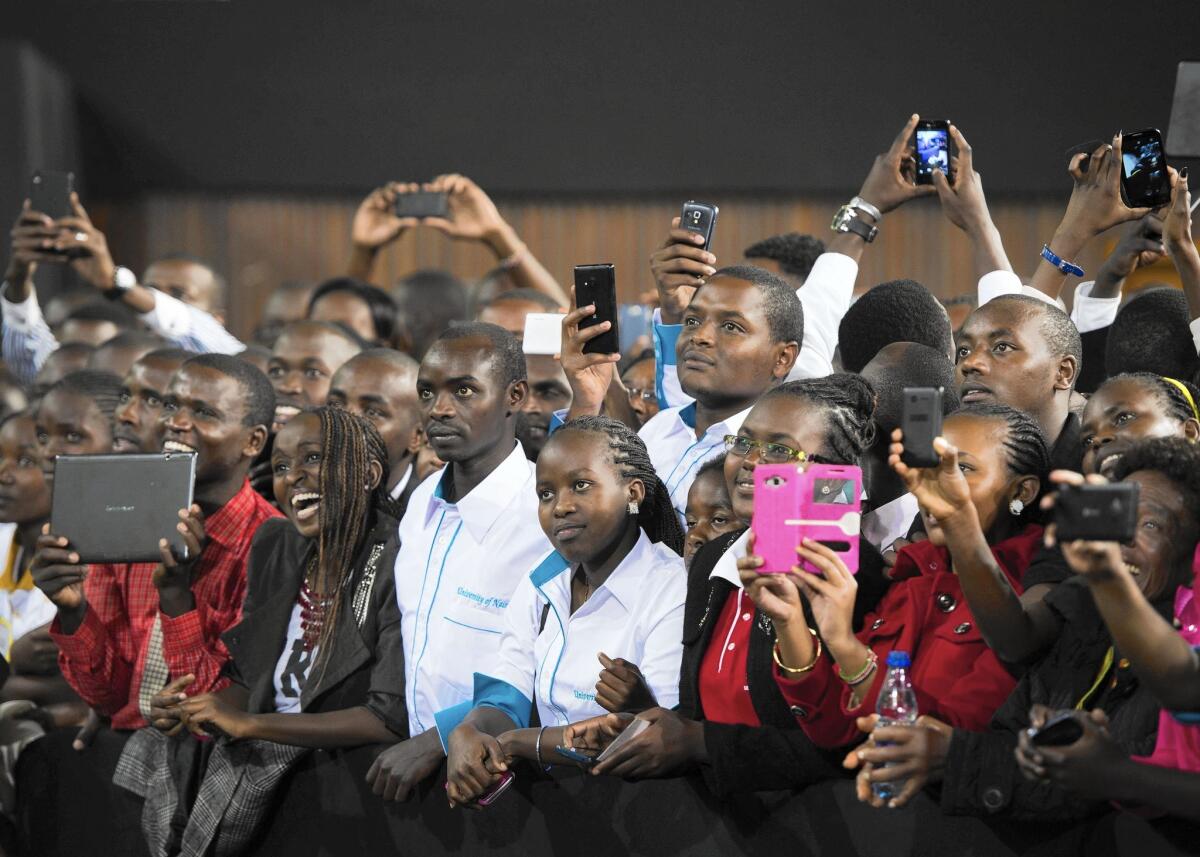Young Africans combine hope and energy to shape their future

The audience focuses on President Obama at an arena in Nairobi on July 26, 2015.
- Share via
Reporting from NAIROBI, Kenya — People like Pretty Arojojoye are a big part of the reason President Obama repeatedly pledges to return to Africa after he leaves office.
Arojojoye was told by tribal leaders in her native South Africa to leave high school and marry. But after nine years of control and abuse she made her own choice — to move into a women’s shelter and start her life fresh.
Education gave her the confidence to stand up for herself, she says, recounting the stolen hours at a local women’s shelter where she secretly earned a counseling certificate through a distance-learning degree program at a nearby college. Her husband had demanded she account for her time, and he hit her if she pushed back.
“Getting that qualification was a liberation,” says Arojojoye, now 34 and living on her own with her three children. “I felt like, ‘I can do it. There are a lot of things I can achieve.’”
Arojojoye runs two women’s shelters, as well as a not-for-profit organization that helps rescue girls from forced marriages and human trafficking and gets them into school.
“Studying and learning, that’s how you liberate,” she said. “It is a powerful tool to lift up yourself and your whole community.”
Arojojoye has studied in the U.S. and meets with other leaders as part of a program organized by the Obama administration after the president made his first trip to the continent in 2009. Several met with Obama on Sunday in Nairobi as he christened a new regional center for the program, the Young African Leaders Initiative.
The president plans to step up his personal involvement in the program when he leaves the White House. He called it his “labor of love” on Sunday and compared it to his work as a community organizer in Chicago.
“We weren’t always completely successful,” he said, “but it taught me the importance of the voices of ordinary people when they come together to create a better vision for the future.”
Dozens of people younger than 35 have studied in the U.S. and participated in regional classes as part of the African leaders program.
Arojojoye, who lives in Pretoria, South Africa, grew up in the tiny community of Nkomazi, south of the Mozambique border, in a Christian family with respect for “traditional leaders” who make many personal decisions for those in the village.
In her 11th year of school she met a boy who carried her books home for her. Arojojoye became pregnant and was told by leaders, “You will marry the man who made you pregnant,” she said in a telephone interview. She was 18 when she married. Efforts to reach her former husband and adult family members in the village for comment were unsuccessful.
“She has gone from victim to survivor to thriver to inspirer,” said Katherine Wald, a licensed psychotherapist in private practice in Miami who met Arojojoye through a nonprofit she co-founded called Inspire Transformation.
A native Swazi speaker, Arojojoye taught herself English by watching television and mimicking the pronunciation of the news announcers.
She began to visit a women’s center and soon discovered she could take classes to become a trauma counselor. A local college offered courses online and, after a couple of years, she earned a certificate.
After that, she says, she realized she could get a job and support herself instead of staying in an unhappy marriage, where she says her husband forced her to take care of children he’d had with other women after he and Arojojoye were married. She moved into the women’s shelter, even though her husband wouldn’t let her take their children — ages 9, 6 and nearly 3 at the time.
“I was not allowed to see her more than once a year,” Arojojoye’s daughter, Khensane, now 15, said in a telephone interview. “I was not allowed to phone her or say her name in the house.”
When Khensane developed a stomach illness requiring constant care, she says, her father let her, her brother and sister leave to go live with their mother.
Arojojoye began a nonprofit organization supporting the kinds of services she believed would have helped her as a young woman.
Her not-for-profit, Ark of Hope, helps girls in rural areas enroll in school and buy educational materials. She raises money by speaking and writing letters, with support of organizations like Wald’s and from Peace Corps volunteers.
Last summer, the leaders program sent Arojojoye to study at the University of Virginia for six weeks. She got intensive training in civic leadership.
Now she talks about the work she does in Nkomazi and Pretoria in global terms. Arojojoye hopes to expand her network to help more women.
More to Read
Sign up for Essential California
The most important California stories and recommendations in your inbox every morning.
You may occasionally receive promotional content from the Los Angeles Times.














